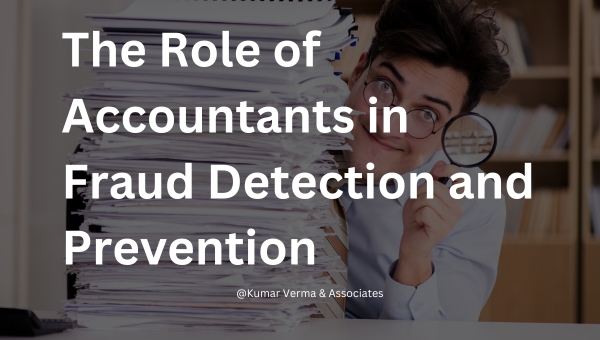In the complex landscape of modern business, fraud poses a significant threat to the financial health and reputation of organizations. Accountants play a crucial role in detecting and preventing fraud, leveraging their expertise in financial analysis, auditing, and regulatory compliance. In this article, we delve into Accountants Role in Fraud Detection and Prevention, exploring their responsibilities, challenges, and strategies for effective prevention.
Understanding the Accountant’s Role in Fraud Prevention
Accountants serve as frontline defenders against fraud, equipped with the skills to identify irregularities and discrepancies within financial records. Their responsibilities encompass various aspects of fraud prevention, including risk assessment, internal controls implementation, and forensic analysis. By conducting thorough audits and examinations, accountants can uncover fraudulent activities such as embezzlement, falsified financial statements, and misappropriation of assets.
Assessing Fraud Risk and Vulnerabilities
One of the primary tasks of accountants is to assess the inherent risks and vulnerabilities within an organization’s financial systems. This involves conducting comprehensive risk assessments to identify potential areas of exposure to fraud. By analyzing historical data, transaction patterns, and internal control mechanisms, accountants can pinpoint areas where fraudulent activities are most likely to occur. Additionally, they evaluate the effectiveness of existing controls and recommend improvements to mitigate the risk of fraud.
Implementing Internal Controls and Compliance Measures
Accountants play a vital role in designing and implementing robust internal controls and compliance measures to prevent fraud. These controls encompass policies, procedures, and systems designed to safeguard assets, deter fraudulent activities, and ensure compliance with regulatory requirements. Accountants work closely with management to establish segregation of duties, authorization protocols, and monitoring mechanisms to strengthen internal controls. By enforcing strict adherence to established policies and procedures, accountants help create a culture of integrity and accountability within the organization.
Conducting Forensic Analysis and Investigations
In cases where fraud is suspected or detected, accountants are responsible for conducting thorough forensic analysis and investigations to uncover the underlying facts and circumstances. This involves gathering evidence, interviewing witnesses, and tracing financial transactions to identify fraudulent schemes and perpetrators. Accountants utilize advanced analytical tools and techniques to reconstruct financial records, detect anomalies, and quantify the extent of losses resulting from fraud. Their findings serve as the basis for legal proceedings, disciplinary actions, and recovery efforts aimed at mitigating the impact of fraud on the organization.
Challenges and Strategies for Effective Fraud Prevention
Despite their critical role, accountants face several challenges in detecting and preventing fraud effectively. One of the primary challenges is the evolving nature of fraudulent schemes, which are becoming increasingly sophisticated and difficult to detect. Fraudsters employ advanced tactics such as cybercrime, identity theft, and social engineering to circumvent traditional controls and exploit vulnerabilities in financial systems.
To address these challenges, accountants must stay abreast of emerging trends and technologies in fraud detection and prevention. Continuous professional development and training are essential to enhance their skills in forensic accounting, data analytics, and digital forensics. Additionally, collaboration with other stakeholders, such as law enforcement agencies, regulatory bodies, and cybersecurity experts, can strengthen the collective effort to combat fraud.
Furthermore, leveraging technology-enabled solutions such as artificial intelligence, machine learning, and blockchain can enhance the effectiveness of fraud prevention efforts. These tools enable accountants to analyze vast amounts of data, detect anomalies in real-time, and identify patterns indicative of fraudulent activities. By harnessing the power of technology, accountants can augment their capabilities and stay ahead of evolving threats in the digital age.
In conclusion, Accountants Role in Fraud Detection and Prevention plays a very important role, serving as guardians of financial integrity and accountability within organizations. Their responsibilities encompass risk assessment, internal controls implementation, forensic analysis, and investigative procedures. Despite facing challenges posed by evolving fraud schemes, accountants can mitigate these risks by adopting proactive strategies, leveraging technology-enabled solutions, and fostering collaboration across stakeholders. Through their diligence and expertise, accountants contribute to safeguarding the financial interests and reputation of organizations in an increasingly complex and interconnected business environment.





















